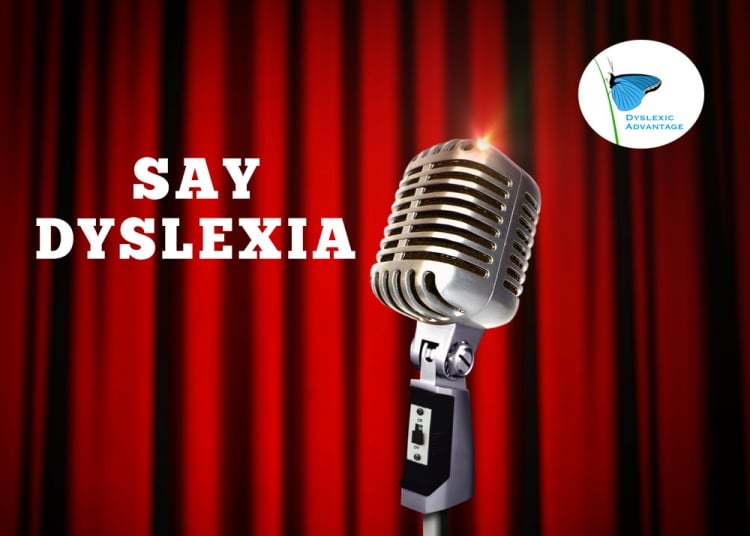It happens to everybody. You research a curriculum thoroughly or it gets through several levels of a review and then you put it into action and… it just doesn’t connect. What do you do? There are several common reasons why a curriculum doesn’t connect with a particular student – and so some trial and error and modification need to take place. The most common reasons that certain curricula fail for a particular student include: 1. Going Too Fast Because there can be difficulty registering information accurately (sounds, letters, words), a student may need to slow the pace down considerably if the lessons aren’t sinking in. It may seem counterintuitive if you feel a student is slipping farther behind, but reducing work and simplifying […]
Why It’s Important to Say Dyslexia But Also Support Its Strengths
What is Dyslexia? Dyslexia is a brain-based learning difference with a strong genetic basis. It characterized by unexpected difficulties in fluent reading and specific patterns of difficulty with writing, spelling, and sometimes math as well as strengths in...
Why It’s Hard to Proofread and Read Fluently [Premium]
It can be maddening. You look and look you just don’t see it. Later you pass your work along, you see all the thing you hadn’t seen the first time round. What’s going on ? You’ve experienced a ‘trick’ of perception. In our clinic, when trying to explain the phenomenon to children, we often use the analogy of optical illusions…when you see something that’s not there or you miss something – that later you can’t believe you could see at the start. These tricks of perception are what adds to the time needed for many dyslexic students on classroom and standardized exams. It accounts for why some teachers may be flabbergasted by a student’s need for extended time, when they seem so quick with problem solving […]
How They Did It: Dyslexia, Gifted Ed, and SAT and ACT Accommodations [Premium]
Today I had a chance to catch up with a member of our Dyslexic Advantage community who had just heard the great news that her 17 year old son had been granted accommodations for both the SAT and ACT, including the calculator-free section of the new SAT. This family navigated several difficult transitions: private school to public gifted school, middle to high school, and now college entrance exams. Accommodations granted this student included: Double time for reading, computer for essay, extra breaks between test sessions, reader, double time for math, double time for essay, record answers in test book, 4-function calculator on non-calculator active sections Hooray! Mom sent all the previous evaluations from All Kinds of Minds (Mel Levine’s old system), but also old speech […]
Q: Can I Join the Military if I Have Dyslexia? Do Accommodations and the ADA Apply to the ASVAB ?
This question comes up often. Many people know that accomplished military dyslexic people (General George Patton, Commander Joseph Hoar [Commander in Chief of US Central Command], among others) have served their country in all branches of the military - including...
Dyslexia and IQ: What You Must Know [Premium]
Here are 4 of the Most Important Things You Should Know About Dyslexia & IQ: #1. It Can Be Used to Identify Strengths and Talents. In our minds, one of the best reasons that dyslexic students benefit by IQ testing is that it can quickly establish their intelligence and strengths. There are many strengths that aren’t measured by IQ testing, of course, but also many that it can find – and it provides an objective standard with schools and other institutions wil accept. For dyslexic students in particular, it tends to trump traditional ‘achievement’ assessments because the best tests are given one-on-one (we do not like group IQ tests) and tests of higher order thinking are for the most part untimed (the verbal tests) involve […]
Can Gifted Kids with Dyslexia Fly at School? – When Tests and Schools Fall Short [Premium]
I recently came across Bobby Gilman’s article on the critical issues facing twice-exceptional or Gifted LD students at school. It’s an ambitious paper for sure, but provides a solid big picture view of the challenges that 2E students face in their pursuit of an appropriate education. The challenges include states drastically scaling back services for students with Specific Learning Disabilities (SLDs) of which dyslexia is considered a part. Sometimes the issue is that the threshold for students to qualify for services is so prohibitively low (e.g. 5 or 12th percentile), that many students are missed and fall off any radar. Regarding Response to Intervention or RTI: Gilman et al. states: “RTI was not developed with gifted children in mind, and adaptation of its rules for gifted children […]
How to Accommodate or Modify Assignments and Tests for Students with Dyslexia and ELLs [Premium]
Many teachers don’t realize that many dyslexic students need modifications in assignments and tests in order to accurately assess their knowledge. Some of these changes will also benefit other students in class including English Language Learners or ELLs. Homework and test questions are sentences that often present information out of context, so that the content is more difficult to read. CLASSROOM ACCOMMODATIONS / MODIFICATIONS FOR STUDENTS WITH DYSLEXIA AND ELLs 1. Less! Reduce the amount of homework to 1/3 or if a student needs to completely redraft work, eliminate assignments until the redrafting process is finished. 2. Be aware that your students may not be able to read word problems or instructions on assignments. 3. Highlight clues. 4. Reduce Choices. Eliminate “All of the above” […]
Latest Research: Advances in our Understanding of Dyslexia, ADHD, and Giftedness [Premium]
It’s long been known that Dyslexia and ADD / ADHD have high rates of overlaps or “co-morbidities”. Dyslexia and ADHD co-occur 30-50% of the time (Germano, 2010) and only 40% of children with dyslexia and 20% of children with ADD/ADHD have it in isolation (Wilcutt and Pennington, 2000). Science has progressed on many fronts over the past 5 years, and both attention and dyslexia are now known to be much more complex than originally suspected. It has long been known that dyslexia is associated with attention and working memory differences, and that reading, writing, and spelling difficulties are higher among children identified as having ADHD. Both Dyslexia and ADD / ADHD are associated with slower processing speeds and both seem to be connected with the […]

![[Premium] What to Do If a Reading Curriculum Doesn’t Work](https://www.dyslexicadvantage.org/wp-content/uploads/2016/09/our-shutterstock-puzzle.jpg)

![Why It’s Hard to Proofread and Read Fluently [Premium]](https://www.dyslexicadvantage.org/wp-content/uploads/2016/09/Screen-Shot-2017-10-07-at-1.49.34-PM.png)
![How They Did It: Dyslexia, Gifted Ed, and SAT and ACT Accommodations [Premium]](https://www.dyslexicadvantage.org/wp-content/uploads/2016/09/Screen-Shot-2019-09-10-at-1.59.16-PM.jpg)

![Dyslexia and IQ: What You Must Know [Premium]](https://www.dyslexicadvantage.org/wp-content/uploads/2016/06/iq-graphic-scaled.jpg)
![Can Gifted Kids with Dyslexia Fly at School? – When Tests and Schools Fall Short [Premium]](https://www.dyslexicadvantage.org/wp-content/uploads/2016/06/shutterstock_281110997.jpg)
![How to Accommodate or Modify Assignments and Tests for Students with Dyslexia and ELLs [Premium]](https://www.dyslexicadvantage.org/wp-content/uploads/2016/04/shutterstock_388591456.jpg)
![Latest Research: Advances in our Understanding of Dyslexia, ADHD, and Giftedness [Premium]](https://www.dyslexicadvantage.org/wp-content/uploads/2016/04/brain-pixabay.jpg)













